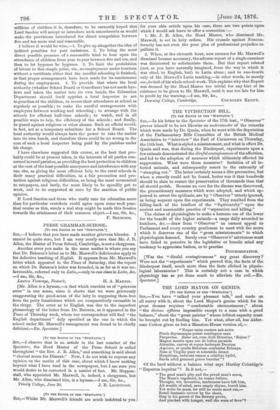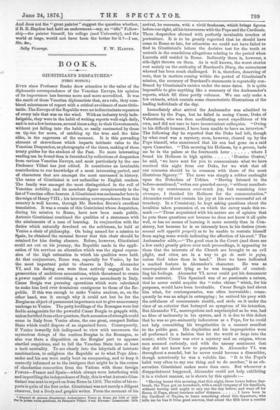THE LORD MAYOR ON GENIUS. [To THE EDITOR OF THE
"SPECTATOR.")
SIR,—You have " talked your pleasant talk," and made us
all merry with it, about the Lord Mayor's genius which for its great dreams requires " comfortable circumstances ;" about "the divinus afflatus impossible except to a man with a good balance," about the " great painter " whose loftiest capacity must be brought out by feeding him. Yet what, after all, has Alder- man Cotton given us but a Mansion-House version of,— " Neque enim cantare sub antro Pierio thyrsumque potest contingere sana Paupertas. Satur est, cum dicit Horatius, Euhoe Magna+ mentis opus nec de lodice paranda Attonita3, currus at equos faciesque Deorum Aspicere, et quails Rutulum confundat Erinnys. Nam si Virgilio puer et tolerabile desset Hospitium, caderent omnes a crinibus hydri, Surda nihil gemeret grave bueeina "
Of the bard without a balance what says Hartley Coleridge's " Expertus loquitur"? Is it not,—
-
"The good man's pity and the proud man's scorn, The Muse's vagabond, he roams forlorn. Thought, wit, invention, tenderness have left him, All wealth of mind, save empty rhyme, bereft him. Yet write he must, for still he needs must eat,— Retail fantastic sorrow by the sheet, Sing in his garret of the flowery grove,
And pinched with hunger, wail the woes of love"?
And does not the "great painter" suggest the question whether, if B. R. Haydon had held an endowment—say, an "idle" Fellow- ship—the painter himself, his college (and University), and the world at large, would not have been the better for it ?—I am, Sir, &c.,

































 Previous page
Previous page